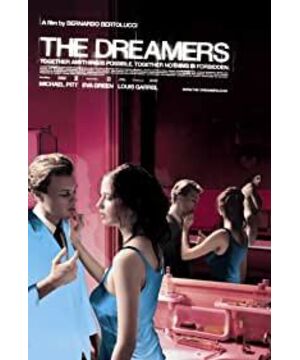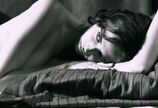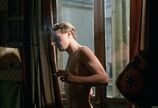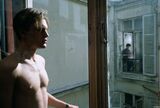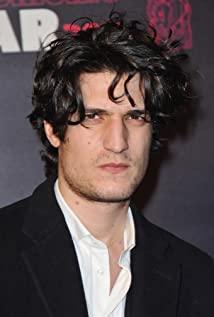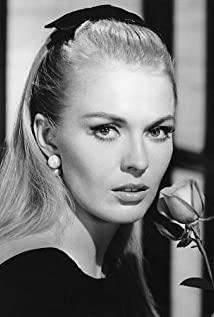This kind of temperament matches the temperament of Paris in a sense, and at the same time, it undoubtedly matches the temperament that a young man who loves movies should have. So we see, Matthew's youth and Paris, and movies, lasting entanglement.
Matthew said: Probably only Parisians would put movies in palaces.
It seems that only Paris, only movies, and only the combination of light and shadow in the Parisian cinema is enough to achieve the unique sensitivity and dreaminess of a person's youth.
In Paris, the young American Matthew saw a lot of independent films and underground films. His life as a student in Paris was projected into the life world of an artistic youth and a petty bourgeois student, as if it would always be a screening in the cinema that excites him again and again.
The story begins in the streets of Paris in the spring of 1968, when film-loving youths staged a peaceful demonstration because the government fired Henri Langlois, the pioneering director of French experimental cinema. Outside the fence of the theater, Matthew, a young blonde from San Diego, California, met the beautiful Isabella and was deeply attracted by her. With their parents traveling, Isabella and her twin brother, Theo, invite Matthew, who they just met, to move into the apartment. Three film-obsessed young men live in an apartment next to the street, and Matthew discovers the physical and emotional attraction between Isabella and Theo as the twins turn life into pure An almost selfish and perverse exploration of film, art, music, sex, politics and philosophy.
In the movie "The Dreamer", the movement of the camera lens is free, sloppy, and decadent, like a drunk poet. The focus of the camera is casually drawing our eyes. On the streets of Paris, the bodies of men and women are slowly cruising. They stop at a certain person, a certain part, and then move away.
The image is gorgeous and decadent, the color is dim and ambiguous, including every inch of the golden skin of the body. This is very much like the nude in the old oil painting, which is clearly presented naked, but through the dense fog filled with oil paint, there is only peeping, but no touching.
What director Bernardo Bertorou wanted people to see in this film was the idealistic air that pervaded the streets of Paris in 1968.
The physical play of Matthew and Theo and Isabel brothers and sisters constitutes a metaphor at this time: when individual lives encounter turbulent political torrents, only physical pornography is the text that you and I can truly believe and grasp.
When the ideal loses its direction, the impulse of life becomes an irresistible desire, the entanglement of eroticism and sexuality between the three people, tension, relaxation, roughness, sexy, silly, sad, and profound. Young Matthew is addicted to movies and dreams, while Bertolucci is addicted to such a confession of "eroticism".
Various symbols from the East and ideology, a piece of red, or a sculpture, exist only as fragments of images. Paris will always be a Paris where art is supreme, and the political language will also be absorbed into the body of art. In the movie, it is wrapped as "erotica". The grand history was torn into fragments of images, and the heavy flesh was filled with irresistible light desires.
Most of the film is enclosed in that apartment, trying to push each other into a very narcissistic game of sexual, cinematic and political debate to show their special attitude to life; though the tall glass windows are just below the street with different voices every day. , but those changes that have replaced the way of thinking in this society seem to have little to do with Isabella and Theo's completely self-indulgent lifestyle. The spring of 1968 was an important period in the transformation of modern Western society. The Vietnam War, the new wave of cinema, new art forms and philosophies all contributed to fundamental changes in society's inherent traditions and moral values. In 1968, when the smoke cleared and the "May Storm" passed, the revolution once again shrank from practice to theory in the study, retreated from the barriers on the streets of Paris to the campus, entered the field of discourse, entered the study of this article, and entered the game of words. The revolutionary carnival of 1968 did not convince people that the power of action was enough to shatter the entire ideology and state apparatus. "No revolution, no collective, no struggle."
At the end of the film, the young Matthew hid behind the bunker of the barricade. He finally failed to stop Theo and Isabel from joining the revolution.
At this time, what is revolution, revolution is not eating and watching theaters, revolution is not murals, revolution is not sex. Revolution is throwing incendiary at your political enemies. Revolutions are not movies, revolutions are bloodshed and violence.
And Matthew doesn't want that kind of violence.
We saw that the Paris armed police in 1968, in the reappearance of Bertolucci's image, swept across the barricade like a tide. As a state machine, they devoured the weak revolution in an instant with an incomparably brave and powerful attitude. those who.
"You can't judge society as an outsider because you are born into this society."
That's how 1968 ended.
View more about The Dreamers reviews


